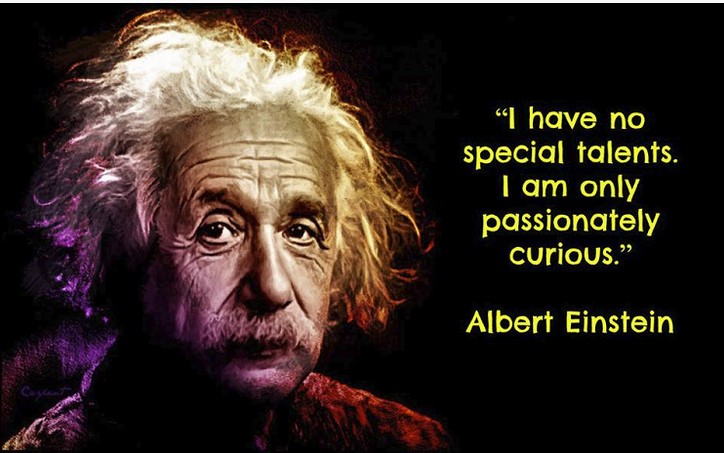Curiosity Skilled The Cat - Optimize For Interesting
Curiosity Fuels Excellence

Curiosity Skilled the Cat: How Thinking Skills Emerge from Inquisitive Minds
The old adage, “Curiosity killed the cat,” warns of the dangers of venturing too far into the unknown.
But what if we reimagine it not as a risk but as a gateway to developing critical thinking and problem-solving skills?
By embracing the phrase “Curiosity skilled the cat,” we shift the narrative, recognizing it as the foundation for how to think effectively.
Optimize For Interesting
I am British and obviously my use of the English language reflects that. I know what is meant by the American phrase "optimize for interesting", namely "to focus on interesting", for instance to focus on what you find interesting in your life and work.
To optimize - sourced from the Latin "optimus" meaning "the best of all work" - refers to the process of making something as good as it can be. It does not mean "to focus".
Optimize - is a word that can be used in many different contexts, the most obvious being search engine optimization [SEO].
In this article our context is thinking skills and specifically how to think effectively, so we are optimizing our thinking skills.
Interesting - is a word sourced from the Latin "interesse" meaning "to differ" or "be important". [It also had another meaning in a financial context as ‘compensation for a debtor's defaulting’ now referred to as a rate of interest.]
If something is of interest to you it:
- Intrigues you
- Fascinates you
- Absorbs you
- Whets your appetite
- Holds your attention
- Lights your fire
- Arouses your curiosity
There is a 2 step process at work here:
- Interesting - If something is interesting, it is engaging, exciting, and it catches your attention.
- Curiosity - Is the feeling that arises when you recognize a gap in your knowledge about something that has interested you and you are motivated to learn more.
Interesting is the spark and curiosity is the fire that fuels the action to acquire knowledge.
We can compress this to: curiosity fuels excellence.
Directional vs Non Directional Curiosity

There are two types of interest and curiosity:
Directional interest and curiosity
- Directional interest is utilitarian. It has a specific point of focus on something that you are already interested in and that you already have some knowledge about.
- It's intention is to discover solutions and it is driven by a curiosity that uses a range of thinking skills such as first principles thinking, second order thinking, and inversion.
- It is rationally based, and it uses the language of words i.e. concepts, categories, and mental constructs, and it also the language of mathematics.
For example, I spend a lot of time reading and reseaching information on the subject of thinking skills. I am always looking for subjects and ideas that catch my interest and that could form the basis of another article for this site.
Non directional interest and curiosity
- Non directional interest is atelic, which is a stoic description of something that has no specific goal and is pursued for its own sake.
- It is random and entirely arbitrary.
- It is intuitive, whimsical and non-rational.
- It employs the primal language of feelings, resonance and consciousnes - in summary, energy.
For example,
I am always fascinated by new ideas, interesting people and places. Having lived and travelled extensively in South East Asia I have exercised my curiosity in many varied and different ways.
I read a wide range of articles, books, journals and reports on anything that captures my interest.
I skim through a lot of not very serious stuff in the popular press and on social media, and as a result of this, occasionally something randomly captures my interest and I google it and research further out of curiosity.
Overall, I am interested in anything anywhere that catches my eye and where I feel an intuitive pull to take a closer look.
Energy as a key component of cognition
In this article we are focusing on non directional interest
because this is where curiosity gets super-charged by the primal language of intuition, feeling, hunch and whim.
This primal language is closely linked to the rational language of cognition and psychologists and neurologists are increasingly in agreement on the interdependence of cognition and emotion.
Without getting stuck in any of the potential rabbit holes surrounding this subject I want to put down a few personal [and subjective] markers as to why non directional interest and curiosity is so important to the optimization of our thinking skills:
- We live in an energetic universe and we are fundamentally energetic beings.
- We live in a participatory universe.
- The words that we use and the beliefs that we hold are a coded representation of their underlying energy.
- Most, maybe all, of the associations that we make about these words and beliefs are energy based.
- Energy can only be experienced, words, pictures, digital etc are all representations of energy.
- Energy based internal computing and processing is faster than the mental realm of words and maths etc.
We are now going to look at two reasons why following your interest and acting on your curiosity is so important to the optimization of your thinking skills.
How Does Curiosity Fuel Excellence In Your Thinking Skills?
[1] Optimize Your Thinking Skills By Improving Your Capability To Learn & Communicate

How can you improve your capability to learn and communicate?
Follow your intuition for random and arbitrary things that catch your interest and then apply your curiosity to learn about them quickly and in sufficient depth so that you can summarise and share this information simply and quickly with others.
As Einstein put it, things should be made as simple as possible, but no simpler.
To borrow from the langauage of IT and AI this process is referred to as compression.
The more you do this, it:
- Increases your ability to quickly process
large quantities of information.
- Improves your ability to communicate what you have learned in a very simple form that is elegant and attractive and therefore easy for others to share and remember.
This is referred to as compression progress.
The Principle Of Compression
In December 2008 in a Cornell University paper, Juergen Schmidhuber, a German computer scientist, published a paper titled Driven by Compression Progress.
The paper looks at humans as information processing machines that are compressing information to make themselves more efficient.
Schmidhuber and his team point out that a simple algorithmic principle based on the notions of data compression and data compression progress informally explains fundamental aspects of attention, novelty, surprise, interestingness, curiosity, creativity, subjective beauty, jokes, science and art.
Schmidhuber says that: “The world can be explained to a degree by compressing it”.
- The human brain loves efficiency - it much prefers to remember one thing rather than ten.
- Good communication uses compression - large quantites of complicated ideas can be packaged up into neat elegant little phrases using simple words with agreed-upon meanings.
For example:
- Love is compression, fusing a series of experiences, memories, feelings, and thoughts into an exhilarating state of mind.
- Quality is compression, when expressed with simple examples that relate to everyday experiences that are easy to communicate and remember.
- Marketeers and advertisers are masters of compression as they sell the "sizzle" before the sausage, the "feeling" that their product will induce in you if you buy it.
- A good joke is compression as it is delivered on the punch line.
Further examples of compression are:
- Nike compressing a whole corporate branding strategy into "Just Do It" accompanied by the Nike symbol
- Nassim Taleb's seminal book on how to benefit from chaos and disorder referenced 500 other books and multiple data sources and compressed as "Antifragile".
- The Pareto Principle, a heuristic that compresses fat tail distribution data as the "80/20 rule".
- Einstein's e=mc2 [energy = mass x the speed of light squared] a compresson of a huge amount of physics.
Compressed ideas can travel farther and faster, through the digital communication channels and also through human minds.
[2] Optimize Your Thinking Skills By Learning Faster

You can optimize your thinking skills by paying attention to the steepness of your learning curve.
The steeper your learning curve the greater the impact on the speed of your compression progress.
The more you challenge yourself in the things that catch your interest the quicker you will optimize your thinking skills.
For example I have no background or training in science, mathematics, IT and statistics, and a very limited understanding of these subjects so I challenge myself by exercising my curiosity on things that interest me that involve a component of any of these subjects.
Mental models
However there is another important and foundational factor that will help accelerate the optimization of your thinking skills and that is mental models.
A mental model is a high level overview of how something works.
Examples of mental models are root cause analysis, the red queen effect, inversion, compounding etc. Think of these as a templates to accelerate your learning process.
You can use sites, such as this one, that have a substantial and easily referenceable store of resources on mental models and apply that to what you are learning.
Mental models help you think effectively.
The late Charlie Munger said: “...developing the habit of mastering the multiple models which underlie reality is the best thing you can do.”
"The models that come from hard science and engineering are the most reliable models on this Earth."
The quality of your thinking processes is proportional to the models in your head and their applicability to the situation under consideration.
The more models you
have the better the quality of your thinking processes and decision making ability.
So, I suggest that as you expand your range of things that are of interest, and that appeal to your curiosity, do so against a background awareness of the main mental models.
Munger says that: "What we need is a latticework of mental models spanning many different domains of information and experience."
- Many people know a little about a little.
- Most people with training and skills in a particular discipline or scope of proficiency know a lot about a little.
- The person with a latticework of mental models knows a little about a lot.
- The serious thinker has a latticework of mental models that enable him/her to know a lot about a lot.
Munger continues: “You don’t have to know everything. A few really big ideas carry most of the freight.”
"It’s kind of fun to sit there and out-think people who are way smarter than you are because you’ve trained yourself to be more objective and more multidisciplinary.
Furthermore, there is a lot of money in it, as I can testify from my own personal experience."
Footnotes:
[1] Hire on aptitude not experience.
Just as a footnote, and based on personal experience, if you are involved in start-ups or if you ever find yourself in a trouble shooting role, hire on aptitude, not on experience.
Is this person ready to do the job? They may never have done it before and have no experience in this area, but are they a smart person who can figure things out? Are they a quick learner?
And I’ve found that’s a much better way to get really effective people.
[2] Dealing With Complex Systems
We are all working with complex systems, and we do so every day. The biggest one is life itself.
Living within a complex system means navigating a world where multiple interdependent factors interact in often unpredictable ways.
Understanding complex systems, and knowing how to work with them, is an important thinking skill.
Traditional thinking is not enough, dealing with complexity requires a more intuitive and collaborative approach and ability to think holistically.
The more you optimize your thinking skills the better able you will be to deal with complex systems.
[3] Final Thought
How fast you can learn is a lot more important than how much you know to begin with.

Further Reading On This Site:
- Charlie Munger - The Importance Of Thinking Skills And Mental Models
- Mental Models - Help You Think Effectively
- Elon Musk - Ordinary People Can Choose To Be Extraordinary
- Understanding Complex Systems Thinking - It's Not Complicated
Third Party Resources:
- Driven by Compression Progress
- Commentary With 2 Caveats - On Progression Progress
- Information Compression as a Unifying Principle in Human Learning, Perception, and Cognition - Wolff - 2019
- ‘Information Compression via the Matching and Unification of Patterns’ (ICMUP) as a foundation for AI.pdf
- Introduction To The Simpliciaty and Power SP Theory of Intelligence.pdf
- Simplicity & Power [SP] - Some Unifying Ideas In Computing.pdf
Return from "Curiosity Skilled The Cat" to:
Inner Mastery For Outer Impact or Walking The Talk
Next Article:
Let Stillness Speak - Living Within A Complex System
LATEST ARTICLES
The Inner Weight of Shame - Sustained By Attentional Fixation
 A Mind That Is Continuously Engaged In Self-Surveillance. Shame is one of the heaviest inner burdens a human being can carry. It does not announce itself loudly or demand attention through drama. Inst…
A Mind That Is Continuously Engaged In Self-Surveillance. Shame is one of the heaviest inner burdens a human being can carry. It does not announce itself loudly or demand attention through drama. Inst…Does Prayer Work? The Psychology of Prayer, Meditation and Outcomes
 Reality Is A Complex System Of Countless Interactions - Including Yours. So does prayer work? The problem is that the question itself is usually framed in a way that guarantees confusion. We tend to a…
Reality Is A Complex System Of Countless Interactions - Including Yours. So does prayer work? The problem is that the question itself is usually framed in a way that guarantees confusion. We tend to a…Living in Survival Mode Without Surrendering Mental Authority
Living in Survival Mode Without Surrendering Mental Authority
 Clear Thinking When You’re Just Trying to Stay Afloat. Many people today are overwhelmed because they are living in survival mode - not temporarily, but as a persistent condition of life. For many, th…
Clear Thinking When You’re Just Trying to Stay Afloat. Many people today are overwhelmed because they are living in survival mode - not temporarily, but as a persistent condition of life. For many, th…Manifestation Without Magic: A Practical Model
 Manifestation without magic is not a softer or more intellectual version of popular manifestation culture. It is a different model altogether. Popular manifestation teachings tend to frame reality as…
Manifestation without magic is not a softer or more intellectual version of popular manifestation culture. It is a different model altogether. Popular manifestation teachings tend to frame reality as…Staying Committed When You Can't See Progress - The Psychology of Grit
 Uncertainty Is Not The Absence Of Progress, Only The Absence Of Reassurance. One of the most destabilising experiences in modern life is not failure, but uncertainty and staying committed when you can…
Uncertainty Is Not The Absence Of Progress, Only The Absence Of Reassurance. One of the most destabilising experiences in modern life is not failure, but uncertainty and staying committed when you can…The Battle For Your Mind - How To Win Inner Freedom In A Digital Age Of Distraction
 From External Events to Inner Events. We often think of “events” as things that happen out there: the traffic jam, the rude comment, the delayed email reply. But what truly shapes our experience is wh…
From External Events to Inner Events. We often think of “events” as things that happen out there: the traffic jam, the rude comment, the delayed email reply. But what truly shapes our experience is wh…How to See Your Thoughts Without Becoming the Story
 A Practical Guide to Thought-Awareness. You can spend your life inside the stories of your mind without ever learning how to see your thoughts clearly and objectively. Most of the stuff we tell oursel…
A Practical Guide to Thought-Awareness. You can spend your life inside the stories of your mind without ever learning how to see your thoughts clearly and objectively. Most of the stuff we tell oursel…The Collison Decision Matrix - A Simple Framework for Better Choices
 The Collison Decision Matrix Is A Practical Everyday Thinking Tool. Most of us spend a surprising amount of time worrying about decisions. From small ones such as what to wear, what to eat, what to te…
The Collison Decision Matrix Is A Practical Everyday Thinking Tool. Most of us spend a surprising amount of time worrying about decisions. From small ones such as what to wear, what to eat, what to te…The Power Of Asking The Right Question
 The Power Of Asking The Right Question Lies In The Quest For Insight. To experience the power of asking the right question you must develop the practice of asking questions. The best way to improve th…
The Power Of Asking The Right Question Lies In The Quest For Insight. To experience the power of asking the right question you must develop the practice of asking questions. The best way to improve th…Site Pathways
 Here is a site pathway to help new readers of Zen-Tools navigate the material on this site. Each pathway is based around one of the many key themes covered on this site and contain a 150 word introduc…
Here is a site pathway to help new readers of Zen-Tools navigate the material on this site. Each pathway is based around one of the many key themes covered on this site and contain a 150 word introduc…How To Live With Contradiction - Beyond Thought Let Stillness Speak
 A major impact on so many peoples' lives is the situational contradiction of unfilled realistic expectations. So where does all this leave us? Well here we are, with mental equipment that is more lim…
A major impact on so many peoples' lives is the situational contradiction of unfilled realistic expectations. So where does all this leave us? Well here we are, with mental equipment that is more lim…